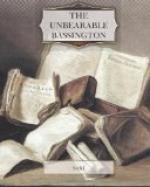and with a certain semblance of special knowledge.
Politics he avoided; the ground was too well known,
and there was a definite no to every definite yes
that could be put forward. Moreover, argument
was not congenial to his disposition, which preferred
an unchallenged flow of dissertation modified by occasional
helpful questions which formed the starting point
for new offshoots of word-spinning. The promotion
of cottage industries, the prevention of juvenile street
trading, the extension of the Borstal prison system,
the furtherance of vague talkative religious movements
the fostering of inter-racial ententes, all found
in him a tireless exponent, a fluent and entertaining,
though perhaps not very convincing, advocate.
With the real motive power behind these various causes
he was not very closely identified; to the spade-workers
who carried on the actual labours of each particular
movement he bore the relation of a trowel-worker,
delving superficially at the surface, but able to
devote a proportionately far greater amount of time
to the advertisement of his progress and achievements.
Such was Stephen Thorle, a governess in the nursery
of Chelsea-bred religions, a skilled window-dresser
in the emporium of his own personality, and needless
to say, evanescently popular amid a wide but shifting
circle of acquaintances. He improved on the record
of a socially much-travelled individual whose experience
has become classical, and went to most of the best
houses—twice.
His inclusion as a guest at this particular dinner-party
was not a very happy inspiration. He was inclined
to patronise Comus, as well as the African continent,
and on even slighter acquaintance. With the exception
of Henry Greech, whose feelings towards his nephew
had been soured by many years of overt antagonism,
there was an uncomfortable feeling among those present
that the topic of the black-sheep export trade, as
Comus would have himself expressed it, was being given
undue prominence in what should have been a festive
farewell banquet. And Comus, in whose honour
the feast was given, did not contribute much towards
its success; though his spirits seemed strung up to
a high pitch his merriment was more the merriment
of a cynical and amused onlooker than of one who responds
to the gaiety of his companions. Sometimes he
laughed quietly to himself at some chance remark of
a scarcely mirth-provoking nature, and Lady Veula,
watching him narrowly, came to the conclusion that
an element of fear was blended with his seemingly buoyant
spirits. Once or twice he caught her eye across
the table, and a certain sympathy seemed to grow up
between them, as though they were both consciously
watching some lugubrious comedy that was being played
out before them.




